| Home > Policy > White Paper, Notice, Announcement > White Paper > WHITE PAPER ON SCIENCE AND TECHNOLOGY2003 > Part1 1.3 1.3.1 1.3.1.1 | ||
Securing a steady supply of qualified human resources capable of operating at world-class levels in science and technology requires conditions that encourage large numbers of top-level,enthusiastic people to select careers in science and technology according to their aptitude.But is a career in sci-ence and technology one that many people would like?Here follows an overview of careers in sci-ence and technology,particularly a career as a re-searcher.
| (Youth Awareness of Occupations in Science and Technology) |
Table1-3-1 compares dreams for the future held by lower secondary school students in Japan,the United States,and China.Responding to the question,"Do you have dreams(hopes)of pouring your passion into a field?"in regards to science,music,sports,fashion,or other fields(five fields in1990,and10fields in2002),students in the United States and China ranked highly fields related to science and technology,such as academics,information technology,while students in Japan opted for such fields as fashion,and animation and comics,and tended to rank fields related to science and technology relatively lower.It would appear from these results that lower and upper secondary school students in Japan do not view careers in science and technology as being very appealing.
Moreover,the results of an international comparative survey targeting lower and upper secondary school students reveals a similar trend.In this survey,one of the possible responses to the question"what sort of thing do you live for as a goal?"was"to make a new discovery in the field of science."The results for this particular response are shown in Figure1-3-2 .Where most lower and upper secondary school students in Japan took a negative view of the response,"No,not particular"or"No,I don't at all"many lower and upper secondary school students in the United States,China,and South Korea reacted with a positive response,"Yes,I do very much"or"Yes,I do a little."This result,as well,appears to show that lower and upper secondary school students in Japan are relatively less likely than students in other countries to believe that a career as a re-searcher is an appealing goal for the future.

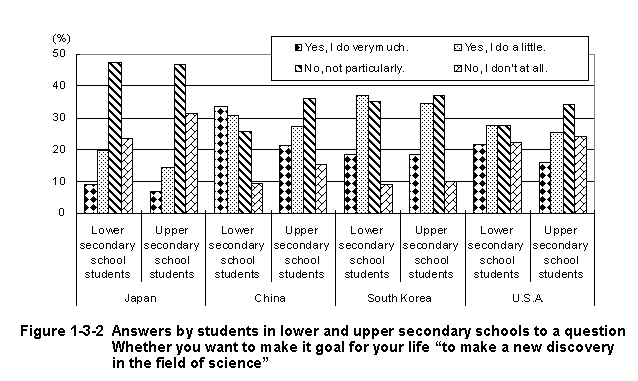
Source:Japan Youth Research Institute."Report on the Survey of Dreams for the21st Century"(1999)
| (Researcher Awareness) |
How people view science and technology,and how they view a career in science and technology,will have a great effect on whether they decide to become researchers.
A survey asked people currently engaged in re-search and development activities why they wanted to become researchers.As shown in Figure1-3-3 ,many people chose to work as a researcher because they were"interested in science and technology,""idolized workers in science and technology,"or could"contribute to society."Many of the respon-dents who said that they became interested in becoming a researcher in lower secondary school or upper secondary school must have at that time idolized the idea of a career as a scientist or technician.When this result is placed alongside the implications of the above survey,that young Japanese today do not find science and technology very appealing,there will likely be difficulties in the future assuring a steady supply of HRST if no attempts are made now to boost the appeal of future careers as scientists or technicians.
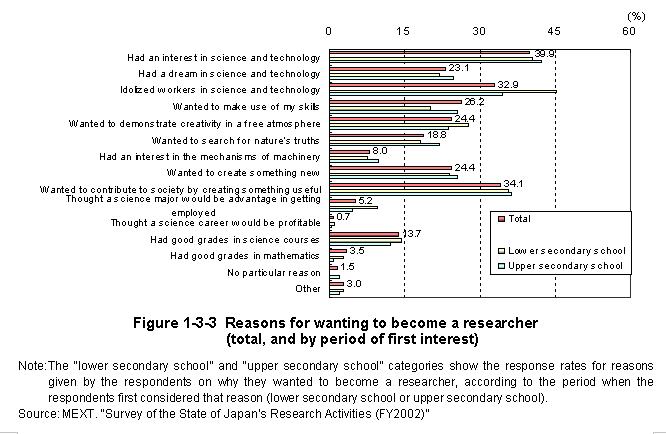
The researchers were asked if they considered choosing another occupation when they were looking for employment(or considering a change of employment),and if so,for what reasons.The results are shown in Figure1-3-4 .
According to Figure1-3-4 ,nearly half of respondents(43.5%)have not chosen any other occupation,nor have they considered a change in employment.On the other hand,this means that more than half of respondents have indeed thought about working in some other career,with their reasons clustering around"because the workplace atmosphere lacks appeal"and"research evalua-tions are not based on skill alone."
While the first reason given above does not necessarily mean that researchers believe that the atmosphere at all workplaces is poor,it does indicate strongly that the appeal of the workplace atmosphere is just as important as salary or benefits.The second reason given shows that a loss of appeal for a career in research can be traced to a feeling that suitable evaluation of research results is lacking or that evaluation results are not properly reflected in employee treatment.
These results show,then,that attracting large numbers of qualified researchers into the research community will require building a framework for making fair evaluations and for reflecting those evaluation results in the employees'treatment,in order to improve the appeal of research careers.
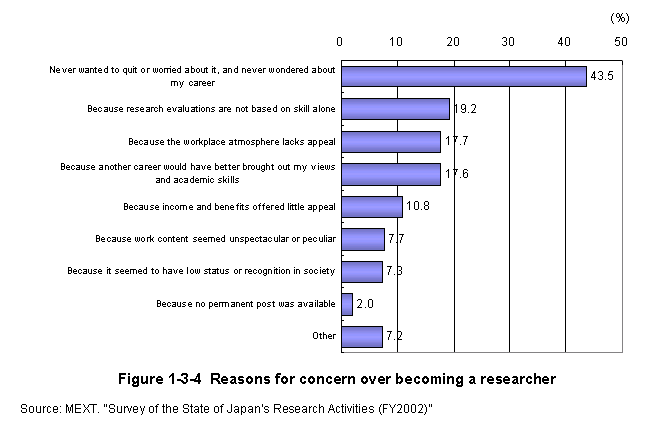
| (Treatment of HRST) |
To determine the appeal of a career in science and technology in terms of compensation,here follows a comparison of wages in Japan and the United States for a number of occupations. Figure1-3-5 shows comparisons of average wages for major occupations in Japan and the United States,assuming an average wage of1.00for all workers in each country.
As can be seen in the figure,in both countries,occupations requiring special technical skills or special knowledge are reimbursed with higher salaries than the average.In addition,wages for aircraft pilots and medical doctors in Japan are higher compared to the average salary than for their U.S.counterparts.In general,however,with the exception of the above two occupations,remuneration in Japan for occupations requiring special technical skills or special knowledge is not necessarily higher than the average wage.In the United States,by contrast,"surveyors,architects,and other engineers,""programmers,"and other technical occupations,including"researchers in the natural sciences,"are paid much higher salaries than the average wage,according to their technical skill.
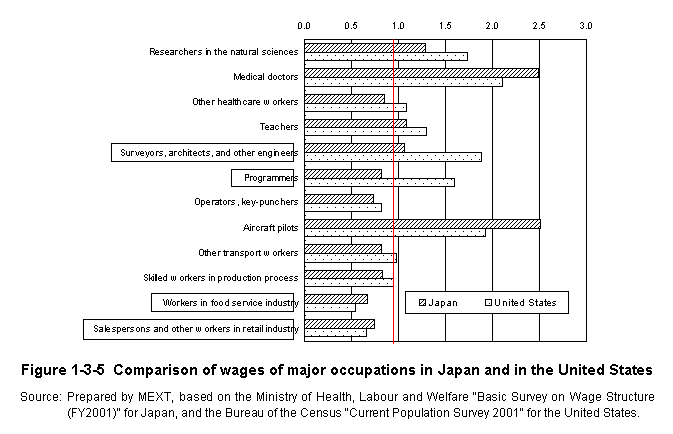
According to the"Statistical Survey into Private Sector Remuneration by Occupation"(FY2001),conducted by the National Personnel Authority,a comparison by occupations of average wages for all workers,including managerial level,shows that the average wages of technology workers in the United States were about1.65times higher than the average office worker,while wages of research workers were about2.13times higher.By contrast,technology workers in Japan were reimbursed only about1.11times higher than the average office worker,and even research workers were only1.18times higher.
These results show that,in Japan,occupations involving advanced technological systems that tend to require large curriculums and long educational processes are not particularly recompensed for their technical skills over other occupations.
Moreover,a survey of research and development in private-sector enterprises found that the vast majority of survey respondents,at65%,reported no difference at all between the average wages of researchers and other occupations (Figure1-3-6) .Of this group,23%of respondents said that the lack of difference was due to the wage system,while41%said that it was the result of performance and skill evaluations.Nearly half of respondents also reported no difference among occupations in the distribution of wages(the spread between the highest and lowest salaries 3) ),showing that corporations make little effort to differentiate between researchers and other company employees in terms of wages.

The current situation can only be presumed to be a negative factor hindering the attraction of top-level human resources into scientific and technology-oriented occupations. Figure1-3-7 shows the responses to a question about people currently employed in research regarding their level of satisfaction with their compensation.As Figure1-3-7 shows,researchers express relatively high levels of satisfaction regarding their freedom to pursue activities outside their institutions and for research activities inside their institutions,while for salaries and promotion,they split between high levels of both satisfaction and dissatisfaction.Many respondents,however,revealed dissatisfaction with issues related to research activities,in the area of special remuneration for research results,and the level of research expenses.So while researchers do not exhibit high levels of dissatisfaction with their current wages,it is also plain that their satisfaction is linked to a suitable level of compensation for research results.
Note3)On the topic of differences in average salary between researchers and other categories,47.0%of corporate respondents said that they use performance and skill evaluation results,and therefore do not differentiate salary based on categories,while another5.2%reported they do not differentiate salary because of differences in the number of people in the managerial class,etc.Combining the two responses adds up to52.2%of corporations reporting no difference in salaries.
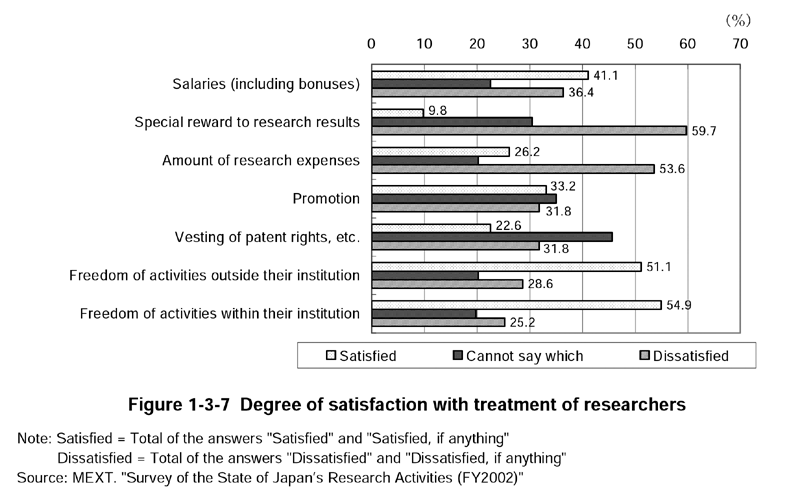
Since it is being creative that constitutes the appeal of research activity,an environment that cannot offer compensation suitable to results will lead to a reduced desire to demonstrate creativity,and will severely reduce the appeal of careers in research.If the appeal of creative activities is boosted,a framework that works through research activities to reflect evaluations and evaluation results in researchers'compensation will need to be built.
It should be noted that the succession of Nobel Prizes awarded to Japanese nationals in recent years has boosted the popularity of academics and doctorates among elementary school children as a future career choice.If these examples can help people to see that excellent research results lead to suitable compensation and to recognition by society,then it will have been effective in boosting the appeal of researcher as a career choice.
| Back to Top | MEXT HOME |